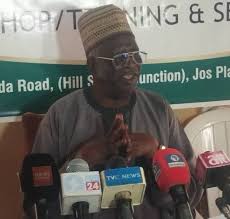By Isreal Adamu, Jos
A former Executive Secretary of the National Council for Colleges of Education (NCCE), Prof. Peter Lassa, has called for a complete overhaul of Nigeria’s 1999 Constitution, citing inconsistencies that hinder good governance.
Speaking at a press briefing at the NUJ Press Centre in Jos on Monday, Prof. Lassa stated that several provisions in the constitution are outdated and do not reflect the current realities of Nigeria’s political landscape.
Inconsistencies in Local Government Autonomy
Prof. Lassa highlighted the confusion surrounding local government autonomy, despite a recent Supreme Court ruling granting financial independence to local authorities. He noted that the 1999 Constitution has yet to be amended to align with this ruling, leading to discrepancies in governance at the local level.
“Even after the Supreme Court judgment, some states continue to operate joint state and local government accounts, contrary to the ruling. This has created significant confusion,” he said.
He also pointed to the constitutional ambiguity in Edo State, where Governor Monday Okpebholor directed councillors to impeach elected local government chairmen, contradicting the court’s verdict on local government autonomy.
Legislative Crisis and Governance Failures
Prof. Lassa cited the case of former Edo State Governor Godwin Obaseki, who failed to inaugurate the full complement of the state assembly, instead running the legislature with a small faction of members for four years.
“Our present Constitution, even with several amendments, has created more confusion rather than correcting lapses. These examples from Edo State are clear illustrations of constitutional ambiguities,” he remarked.
He argued that a complete revision of the 1999 Constitution is necessary to eliminate inconsistencies and misinterpretations.
Overconcentration of Power at the Federal Level
According to Prof. Lassa, the Nigerian Constitution has failed to properly delineate powers among the federal, state, and local governments.
“Nigeria operates a federal system with three tiers—federal, state, and local governments. However, in reality, the central government has become too powerful and ineffective, as seen in the country’s state of affairs,” he noted.
One major issue, he explained, is the flawed security architecture. While state governors are designated as the chief security officers of their states, they lack the authority to issue direct orders to their commissioners of police, who take instructions from the federal level.
A Constitution That Fails the People
Prof. Lassa strongly criticized the impact of the current constitution, stating that it has consistently produced poor leadership, economic hardship, and insecurity.
“The 1999 Constitution, even with its amendments, has not given Nigerians the government that meets their aspirations. It has led to unimaginable poverty and has fueled the rise of insecurity, with new threats constantly emerging, from Boko Haram to bandits, unknown gunmen, and other groups,” he lamented.
He also pointed to the deteriorating state of education, with millions of children out of school, and widespread corruption facilitated by the constitutional structure.
A Call for a People-Centered Constitution
Prof. Lassa emphasized the need for a new constitution that truly represents the will of the Nigerian people.
“We need a brand-new Constitution—one made by the people, for the people—well-drafted, free from multiple interpretations, and consistent in its wording and application,” he asserted.
According to him, only a complete overhaul of the 1999 Constitution can address Nigeria’s deep-rooted governance challenges and pave the way for a more functional and effective democracy.





